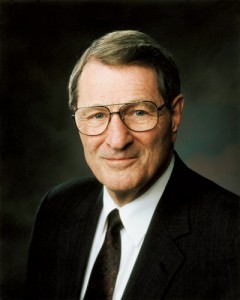By Elder Neal A. Maxwell
By living the gospel, our mortal afflictions can be “swallowed up in the joy of Christ.”
EDITOR’S NOTE: As a former Church commissioner of education, General Authority, and BYU trustee, Elder Neal A. Maxwell, who died July 21, developed a close relationship with Brigham Young University. In these roles he spoke to university audiences at devotionals and firesides more than 20 times. This condensed reprint of his Jan. 23, 1996, devotional shares Elder Maxwell’s wisdom and love once again with a BYU audience.
SOMETIMES we may seem to emphasize the seemingly stern gospel requirements without consistently and helpfully identifying the joys, the blessings, and the advantages of gospel living—both here and now and in the there and then.
We can, in pursuing terrestrial objectives, have “joy . . . for a season” (3 Ne. 27:11). Some of the commandments of men, though lesser commandments, may, at times, be aligned with certain gospel values and principles. But keeping the commandments of men is not going to bring us a fullness of joy. In fact, we cannot expect to have a fullness of joy in this life until, as the scriptures inform us, the body and spirit are “inseparably connected” (D&C 93:33). But we can still have much joy and much happiness in life. In fact, God is delighted when His children keep His commandments because then His children are truly happy! And He wants us to be happy. After all, His plan is called “the plan of happiness” (Alma 42:8).
As we speak of joy, it is important for us to realize what I recall reading somewhere: “God is serious about joy.” Joy is the essence of what He would have us experience.
I continue by asking you a rhetorical question: What are you actually and specifically deprived of by serious gospel living?
Ponder these examples. By complying with the revealed Word of Wisdom, you are much more likely to be deprived of lung cancer, and surely deprived of becoming an alcoholic. You are much more likely to miss out on AIDS if you keep the seventh commandment and refuse to use drugs.
By responding to the strong gospel emphasis on education, you will also be deprived of being ignorant.
You will be deprived of that large dose of human despair that “cometh because of iniquity” (Moro. 10:22). You will also miss out on the exhausting and finally futile calisthenics of trying to mold a meaningful morality by using the Play-Doh of permissiveness.
Yes, you will be tested and puzzled, but because of your faith in God’s plan of salvation, you will be deprived of cynicism, that corrosive emotion that relentlessly expresses itself in a hundred different ways.
Obviously, you could easily add many more examples of what may for the moment seem to be deprivations that are actually great benefactions, greater than you can now fully appreciate!
A major point about joy is that joy is obviously of a higher order than mere pleasure. Pleasure is perishable. Mere pleasure is not lasting because it is constantly feeding on itself. Thus the appetites of the natural man, though frequently fed, are never filled. The same pattern prevails with regard to the praise of men, to lust, and to greed. Strange as it seems, so far as the carnal pleasures are concerned, the very act of their consumption insures the cancellation of their satisfactions. They just do not last!
Joy, on the other hand, is lasting. It involves the things that really matter, such as being forgiven and forgiving another. One true test of ultimate value has to do with whether or not something is lasting. This criterion is not one to which the things of the flesh can successfully respond.
No wonder, therefore, the pleasurable things of the day and the things of the moment—such as having political power and social sway—are so fleeting. They are unrelated to true joy and to the everlasting things. Mere popularity, for instance, is not only transitory, it can also be dangerous. Wise President N. Eldon Tanner cautioned us, “This craving for praise and popularity too often controls actions, and as [people] succumb they find themselves bending their character when they think they are only taking a bow” (N. Eldon Tanner, “For They Loved the Praise of Men More Than the Praise of God,” Ensign, November 1975, p. 76).
Sometimes, therefore, it is wrong to belong:
Nevertheless among the chief rulers also many believed on [Christ]; but because of the Pharisees they did not confess him, lest they should be put out of the synagogue:
For they loved the praise of men more than the praise of God. [John 12:42–43]
The synagogue is a metaphor for any lesser, mortal belonging that can divert or dilute our efforts, first of all, to build up the kingdom of God (see JST, Matt. 6:38).
Some of what has preceded has been related to the natural human desire you and I have to belong and to have people notice and care. My plea is not to downplay that basic fundamental need, because it is there for a reason. Instead, I ask you to distinguish between belonging in a proximate way and belonging in an ultimate way. One can, for instance, be part of a churning, changing group in an airport transit lounge. Yet this is not belonging. One can, instead, begin to sense that he or she belongs to God and that we are part of something that is very, very special and very, very large. I love these lines from G. K. Chesterton, the brilliant Catholic writer:
How much larger your life would be if [you] could become smaller in it. . . . You would begin to be interested in [others]. You would break out of this tiny . . . theatre in which your own little plot is always being played, and you would find yourself under a freer sky, in a street full of splendid strangers. [Orthodoxy (Garden City, New York: Image Books, 1959), pp. 20–21]
The gospel tells us who those “splendid strangers” are. It gives us a sense not only of the immensity and the vastness of God’s work, but also of the great personalness of His work as well.
Since a real sense of belonging matters, one of the great things we can do for family and friends is to contribute regularly to their storehouses of self-esteem by giving deserved and specific commendations and encouragement.
A fascinating thing about joy and love is that when we enlarge our capacity to love, other people become real individuals, not merely functions. Gospel duties cease to be mere routine and become, instead, doors to delight. Every doctrine of the gospel is a door to delight that, when opened, exposes us to a vista of things we have not yet fully comprehended.
Joy not only helps us do our gospel duties but increases our individuality. It is sinners who reflect such a stale sameness. Righteousness lends itself to individuality. Think, in contrast, of poor Lemuel, who “hearkened unto the words of Laman” (1 Ne. 3:28). One wonders if Lemuel ever had any thoughts of his own.
As we see righteousness in someone like Brigham Young or Eliza Snow, then we see a flowering of individuality and an immense use of talents and integrity.
Another of the many advantages of the gospel is that we avoid the problem Paul cited of members who fainted in their minds and who grew weary (see Heb. 12:3). We have a special promise concerning how to avoid getting weary intellectually. The Doctrine and Covenants says if we are faithful and if we will share the gospel, we “shall not be weary in mind” (D&C 84:80). What a great blessing! We avoid weariness. We avoid boredom.
When Nephi was reactivating people, he was commended for his unwearyingness (see Hel. 10:4). But his unwearyingness reflected the joy he had in the significant labor he was performing. As Nephi regenerated others, he renewed himself! Likewise, when you and I extend genuine empathy to someone else, we are emancipated from the full weight of our own cares. Then our souls, too, are enlarged without hypocrisy (see D&C 121:42).
You are in the process of becoming men and women of Christ. Heavenly Father doesn’t want us, as His spirit sons and daughters, to be mere automatons, dutifully jumping over what seem to be arbitrary hurdles. Instead, He wants us, His children, to be empowered to choose for ourselves, to choose joy instead of misery (see 2 Ne. 2:25–27).
Joy will come in a thousand ways—when we see a relationship mended or enriched. The apostle John understood all this and wrote, “I have no greater joy than to hear that my children walk in truth” (3 John 1:4). Children who walk in truth can access the Spirit; they can receive personal revelation.
The phrase “alive in Christ” (2 Ne. 25:25) describes individuals whose aliveness is enhanced by their righteousness. We are the most joyful when we are the most alive. And Jesus, because He was the most empathic, most loving, most forgiving, and the most appreciative individual to ever live on this planet, has a perfect fullness of joy. No wonder He instructs us, “What manner of men [and women] ought ye to be? Verily I say unto you, even as I am” (3 Ne. 27:27). He wants us to have great joy.

With each increasing measure of righteousness, we experience one more drop of delight until our hearts are “brim with joy.”
When we reach a point of consecration, our afflictions will be “swallowed up in the joy of Christ” (Alma 31:38). They will be put in a perspective that permits us to deal with them. With our steady pursuit of joy and with each increasing measure of righteousness, we will experience one more drop of delight—one drop after another—until, in the words of a prophet, our hearts are “brim with joy” (Alma 26:11). At last, the soul’s cup finally runs over!
May you be sufficiently committed to be “alive in Christ,” even in the turbulent last days in which you will live. For, indeed, whatsoever afflictions you may have, they can be “swallowed up in the joy of Christ.” God’s hand is a loving hand, stretched out to love and to lead us, if we will, into a fullness of joy. Of this joy that awaits us, I testify in the name of Jesus Christ. Amen!
The full text of this and other devotional and fireside addresses by Elder Maxwell is available at speeches.byu.edu.







